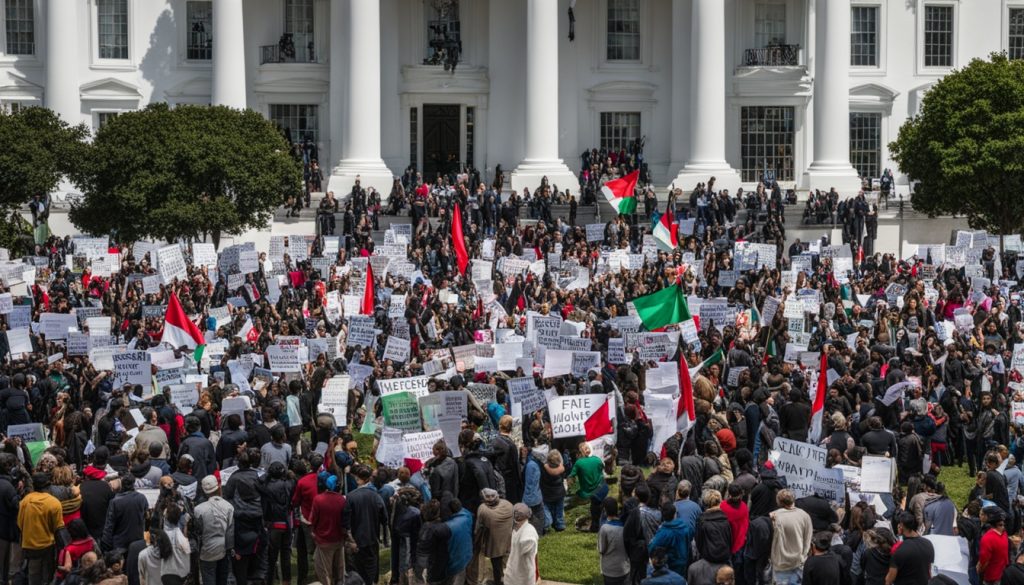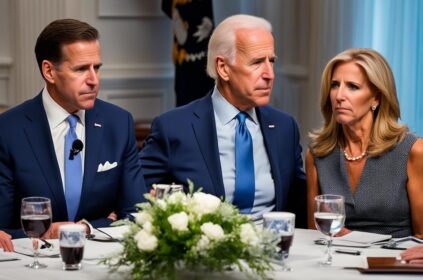The White House is against the GOP’s Israel Security Assistance Support Act. This law wants to speed up sending defense items to Israel. It says these items can be sent directly or by third parties. Many people in the government are against it because it changes who gets to decide foreign and defense policies.
People who support the bill think Israel needs more defense against groups like Hamas and countries like Iran. But, the White House says it takes away the president’s freedom to set foreign policy and defense goals.
Key Points
- House Republicans have introduced the Israel Security Assistance Support Act.
- The bill aims to compel the swift delivery of defense weapons to Israel.
- The White House has articulated its objection to the GOP-led bill.
- The legislation seeks to prevent the current and future presidents from withholding approved military shipments.
- The bill is argued to safeguard Israel amidst threats from regional adversaries.
- The controversy highlights a broader debate over the role of legislative action in foreign policy.
Background on the GOP-Led Bill
The GOP-led bill, also known as the Israel Security Assistance Support Act, is aimed at making sure Israel gets help on time. Its goal is to help Israel’s defense without the president causing delays. It shows House Republicans’ strong support for Israel’s security.
Purpose of the Bill
This bill is about making sure defense items get to Israel quickly. It’s part of House Republicans’ commitment to keeping Israel and the U.S. close. They want to avoid any delays that might happen because of the current president.
Introduction by House Republicans
House Republicans felt it was important to push for the Israel Security Assistance Support Act. They believe in reinforcing the supply of vital defense items to Israel. They were worried that decisions by the president could lead to problems, highlighting the need for a steady defense partnership with Israel.
White House’s Initial Reaction
The White House reacted strongly, showing deep concern about the GOP-led bill. Press Secretary Karine Jean-Pierre sharply criticized it. She pointed out worries about the bill’s effects.

Statement from Press Secretary Karine Jean-Pierre
Through a prepared White House statement, Karine Jean-Pierre expressed strong disapproval. She mentioned that the bill would wrongly restrict the President’s power. This could limit how the U.S. deals with sudden changes in security around the world.
Specific Concerns Raised
Jean-Pierre noted this bill might get in the way of key foreign policy goals. She pointed out that it could slow down how quickly the government reacts to new security problems globally. These worries focused on keeping the flexibility needed for U.S. foreign policies.
| Key Concerns | Implications |
|---|---|
| Limitation on Presidential Authority | Restricts flexibility in crisis response. |
| Impact on Foreign Policy Objectives | Undermines strategic planning and execution. |
| Security Assistance Management | Alters traditional balance of power. |
Impact on U.S. Foreign Policy Objectives
The Republican-led effort makes us think deeply about its effect on America’s foreign policy. The proposed bill is more than just about making new laws. It changes how the U.S. works with other countries and its long-term goals.
This discussion also highlights the struggle between the different government bodies’ roles. The bill may change how Congress gets involved with foreign matters. This could change how the country handles its relations and military strategies.
At the heart of this debate is how it affects the U.S.’ important global goals. It raises questions about who holds the true power and how that impacts alliances and talks with other nations.
Let’s look at how this bill might influence key goals in a simple way:
| Aspect | Legislative Impact | Executive Autonomy |
|---|---|---|
| Decision Making | Increased Congressional Involvement | Reduced Flexibility for Executive Actions |
| Strategic Objectives | Potential for More Immediate Results | Long-term Strategic Planning |
| International Relations | Possible Rapid Policy Shifts | Stability in Diplomatic Engagements |
Republican Criticism of Biden Administration
Republicans are turning up the heat on President Biden’s Israel policy. They’re pushing for quick military aid to Israel, including through third parties. Many GOP members are loudly showing their displeasure about any Israeli aid slowdown.

Accusations of Strengthening Hamas
Biden is facing heat for possibly making Hamas stronger. The delay in aiding Israel, when facing threats from Hamas and others, is seen as a big mistake. Many Republicans say the delay shows the administration’s poor planning for the Middle East.
Republicans are pushing a bill that stops money to top officials until Israel gets its aid. It underscores Israel’s right to defend itself and wants Congress to keep a close watch on how security funds are spent. They aim to make sure Israel gets aid promptly without any more delays.
Furthermore, the bill requires a detailed report on why security aid to Israel was held back. This is about being open and answerable about the decisions made. Republicans are working to end what they see as serious errors in how the administration supports Israel.
Details of Withheld Military Shipments
The debate heats up over delayed military aid to Israel. President Biden decided to hold back one arms shipment. This decision is part of a bigger picture, connected to a full aid package and the details of those withheld military aids.
Specific Weapons and Defense Articles
The held-back shipment has key defense items for Israel’s safety. It includes systems like missile defense and precision-guided munitions. The details of these held shipments show the challenges of meeting defense commitments on the global stage.
Timeline of Withheld Aid
The delay in aid matches up with certain laws made earlier. This is about a full aid package that was recently approved. These steps show ongoing talks on how to best handle and give aid to Israel.
White House Clarifications on Intentions
The White House was clear again about helping fulfill the congressional aid package for Israel. They confirmed their commitment to comply with Congress’s legal requirements. The administration wants to use the $17 billion package wisely, following the laws and keeping the nation safe.
Commitment to Congressional Aid Package
The Biden team explains the delay in sending some military help, like the 2,000-pound bombs. They worry about these weapons being used in crowded areas. But, they stress that this delay fits with keeping the country secure, according to White House clarifications.
- Over 56,000 infrastructure projects have been initiated by the Biden-Harris administration.
- The Infrastructure Law has facilitated over $450 billion in investments.
- Affordability, connectivity programs have benefited more than 23 million households.
The White House is also working hard to make peace between Israel and Arab states. This is crucial for Israel’s safety in the future. President Biden supports a two-state plan, showing the White House’s full support for peace in the Middle East.
| Categories | Details |
|---|---|
| Infrastructure Projects | 56,000 projects announced |
| Investments | $450 billion delivered |
| Household Connectivity | 23 million households connected |
Internal Democratic Party Conflicts
Tensions are rising within the Democratic Party over how the government is handling the Israel-Hamas conflict. This issue sparked a major political outcry within the party.
Concerns from Democratic Lawmakers
Democratic lawmakers are worried about the White House’s actions towards Hamas. The conflict’s devastating toll included over 1,200 deaths and around 240 abductions on October 7. This has forced many lawmakers to rethink their positions.
More than 100 hostages have been freed, but many are still captive. The situation has prompted hard discussions among members.
Letter to President Biden
Twenty-six Democratic lawmakers sent a strong letter to President Biden. They voiced deep concerns over the government’s approach to dealing with terrorist groups. The letter, also highlighting over 35,000 Palestinian lives lost,
stressed the urgent need for new strategies.
In the midst of this, over 190 UN staff members have lost their lives, mostly Palestinians. The necessity for the evacuation of 360,000 and the critical needs of hospitals in Gaza amplify the seriousness of the situation. Lawmakers’ call for action is more urgent than ever.
Rocket Attacks from Rafah and Hezbollah
The conflict is seeing more rocket attacks on Israel. Since President Biden said no to some arms, Rafah and Hezbollah have attacked more. This has put many areas at risk.

Rocket Attacks on Beersheva
Beersheva is under threat with many rocket attacks. On May 10, the IDF stopped two rockets from Rafah near Kerem Shalom. Yet, over 15,000 rockets and other threats were aimed at Israel since.
Hezbollah’s Barrage into Kiryat Shmona
Hezbollah is now attacking northern Israel too. They’ve launched rockets from Lebanon, hitting places like Kiryat Shmona. On May 9, they sent two drones up north. This makes the border areas very concerning.
The violence shows how tense things are. These rocket attacks make peace harder to reach. It tells us that the area really needs outside help to calm down.
Read more detailed reports and updates in the JINSA document.
White House Protests GOP-Led Bill That Would Compel Israel Support
The White House fights a GOP bill that aims to make Israel support a must-do. This sparks a big fight in the government. The bill faces strong opposition from the current leaders. They say it takes away their decision-making power. The argument centers on how much say the government should have in supporting other nations.
House Republicans launched the bill to speed up military help for Israel. But the White House claims it steps on their toes. They want more leeway in making foreign and defense plans.
People worry the bill could force help for Israel without letting the president make changes. This worry points out a bigger argument about who gets to decide on things like this. It shows a big debate about the rights and roles of the different parts of our government when it comes to international promises.
The table below shows where each side stands:
| Party | Position | Key Points |
|---|---|---|
| White House | Against | Executive authority, flexible policy application |
| GOP | For | Compel Israel support, legislative oversight |
With strong points from both sides, the debate will likely go on for a while. It’s a major issue in the government right now.
Global Reactions to U.S. Legislative Actions
The GOP-led Israel Security Assistance Support Act has caused a stir. It’s faced global reactions and sparked international concerns. Many voices around the world are speaking up. They talk about how this might change things in U.S. foreign policy and its worldwide effects.

International Concerns
Countries from every part of the globe are concerned about the new bill. European allies are particularly worried. They fear it could affect regional stability and the big picture of world politics. The possibility of strained diplomatic relations is a top concern.
They’re also worried about what this might mean for future actions similar to this one. They are watching closely to see if this bill sets a new kind of standard.
Statements from Israeli Officials
Israeli officials’ statements shed light on their view of the bill. They point out how critical ongoing defense support is. They explain that any delays or cuts could put their national security at risk.
Israeli leaders speak positively about getting help on time. They also say it’s key to keep their friendship with the U.S. strong.
| Country | Reaction | Key Concerns |
|---|---|---|
| United Kingdom | Wary | Regional Stability |
| Germany | Cautious | Diplomatic Relations |
| Israel | Supportive with Reservations | National Security |
| France | Critical | Legislative Overreach |
| Canada | Neutral | Long-Term Implications |
Analysis of Political Demonstrations
A GOP-led act, the Israel Security Assistance Support Act, has caused a big stir. People across the nation are protesting its effects on U.S. foreign policy and neglect of domestic needs. This has led to debates on the bill’s wider consequences for the country’s politics and social state.
Public Outcry and Protests
People are speaking out against putting military aid to Israel above needs at home. They say the bill’s emphasis on sending weapons doesn’t help Americans in tough times, especially with the economy. There’s also concern over civilian deaths in Gaza, with thousands of lives lost, mostly those of women and children.
Impact on Public Opinion
These protests have changed how many view government decisions. Issues like the food shortage in northern Gaza and high civilian deaths from Israeli strikes make people question foreign policy. This has led to a call for a new U.S. strategy that takes ethical and domestic needs into account.
The protests and public concerns show a demand for smarter foreign policy. They’re having an effect on the political conversation and could lead to changes in how the U.S. deals with Israel and other global issues.
Comparison with Previous U.S. Legislation on Israel
Looking back is key to making sense of the talks around U.S. laws about Israel. Throughout history, the U.S. Congress has really backed Israel. Both the House and Senate came together to help Israel with major military gear. This move shows strong bipartisan support for Israel.
These laws have often limited the president’s freedom in dealing with other countries. For example, recent laws tried to stop President Biden’s efforts to pause important security help for Israel. In the past, laws have quickly offered help to keep Israel safe from big threats and attacks. This shows the deep friendship between the U.S. and Israel.
When we look at U.S. laws, a clear trend shows up. Congress often steps in to check on and control how money gets spent on security help. They’ve put rules in place to make sure the president is clear about how this help is being used.
The U.S. has always tried to reduce hate against the Jewish people. When leaders paused sending weapons – a move that critics said was risky – Congress reacted. They proved they want to keep Israel safe from new dangers. Over time, this support has been key in building strong ties between the U.S. and Israel.
Taking a closer look, it’s not just about different political parties’ views but also about how united Congress is. Even with changing stands from the president, Congress’s past actions tell us a lot about what the future might hold for U.S.-Israeli relations. The history shows how important Congress is in helping Israel protect itself as threats grow.
Future Implications for U.S.-Israeli Relations
The GOP-led bill issue is a big deal for the future of US-Israeli relations. The U.S. government’s discussions are shining a light on the partnership with Israel. Decisions being made now will shape how the nations work together both in politics and the military.
We should look at both short-term and long-term effects of this bill. If the bill influences US foreign policy, it could change how America interacts with other countries, especially troubled areas.
| Aspect | Current Scenario | Potential Changes |
|---|---|---|
| Military Aid | Based on executive discretion | Shift to legislative-mandated shipments |
| Diplomatic Relations | Managed through executive branch | Increased congressional oversight |
| Strategic Goals | Aligned with national security and foreign policy objectives | Possible realignment based on new legislative directives |
Studying these changes shows us how US-Israeli relations could change. There’s a chance for closer legislative checks on this important partnership. If this happens, it might change how the two countries work together in defense and other key areas.
Conclusion
The ongoing talks about U.S.-Israel relations bring out many details. These include the review by the Biden administration. It found that Israel didn’t misuse U.S.-given weapons during the Gaza conflict. This shows the fine line between helping and making sure the aid is used rightly. For more info, you can check out this Fortune article to know more about the White House’s view.
During a seven-month war, Israel’s actions led to many deaths, with about 35,000 Palestinians, including lots of women and children, losing their lives. The White House responded to these awful events by stopping a shipment of 3,500 bombs. They were worried about what could happen in Rafah. This shows how pressure, both from inside and outside, makes the White House ensure laws and human rights are respected.
In history, the U.S. has sometimes held back military aid to guide Israel’s choices. Now, the Biden administration is thinking of reducing aid if Israel doesn’t change how it deals with conflicts and humanitarian problems. The situation is tricky, especially with reports on attacks on places like hospitals and schools. These reports show a high number of civilian deaths, making it even more complex.
With these events, the debate over who has more say, lawmakers or the president, is growing. It’s making the future very uncertain. Figuring this out needs a lot of thought. We must find a way that protects our security while being ethical and meeting the world’s expectations. Talking about these matters is crucial to make sure U.S. decisions are the best for both our global strategy and moral standards.
FAQ
What is the GOP-led Israel Security Assistance Support Act?
Why is the White House protesting this bill?
What are the specific concerns raised by the White House?
How has this bill affected U.S. foreign policy objectives?
What criticisms have Republicans leveled at the Biden administration?
Which military shipments have been withheld by President Biden?
What has the White House clarified about its intentions regarding the aid package?
What internal conflicts have arisen within the Democratic Party?
What were the consequences of President Biden’s statement on withholding offensive arms?
How have international entities reacted to the GOP-led bill and the White House’s response?
How have public protests influenced the political discourse surrounding this bill?
Can this controversy be compared to previous U.S. legislative actions about Israel?
What are the future implications for U.S.-Israeli relations due to this ongoing dispute?
Links
Bipartisan conflict Diplomatic tensions Foreign Policy GOP bill International relations Israel support Legislative action Political protests US politics White House
Last modified: May 14, 2024









